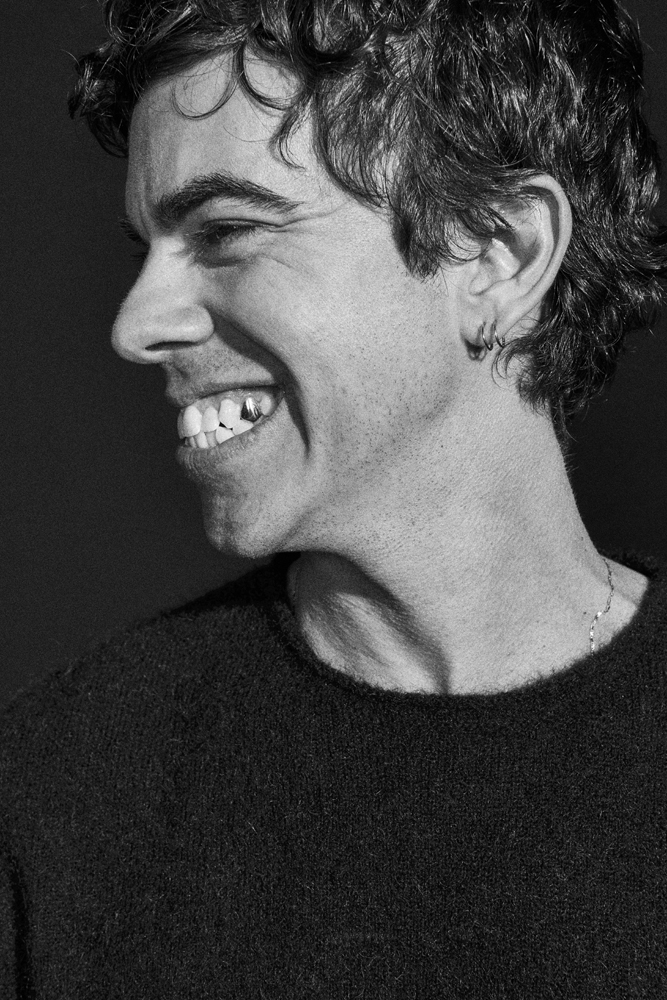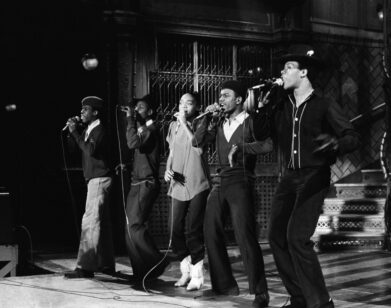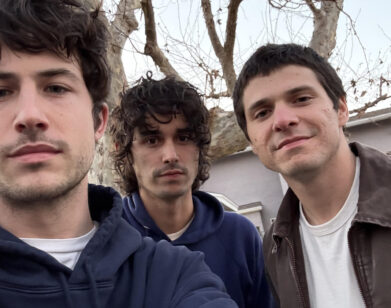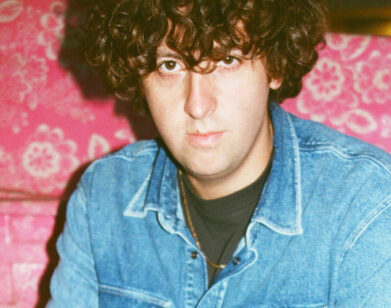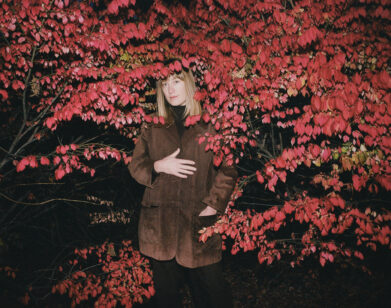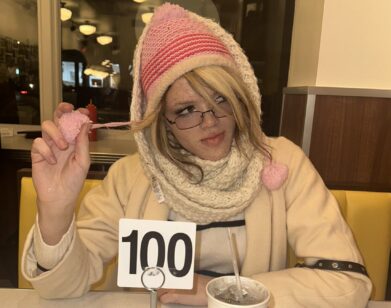Electric Guest
ELECTRIC GUEST IN LOS ANGELES, JANUARY 2017. PHOTOS: DANI BRUBAKER. STYLING: TIFFANI CHYNEL/THE WALL GROUP. GROOMING: MAKIKO NARA FOR WALTER SCHUPFER MANAGEMENT USING MAC.
“Honestly, a year and a half ago, we turned in an album that nobody really liked,” says Asa Taccone, one half of the Los Angeles-based duo Electric Guest. In April of 2012, Taccone and bandmate Matthew Compton released Mondo, their funky first album, and since then they’ve worked consistently (both on outside projects like films and on their own music). But when they completed the LP’s follow-up, the tone they arrived at wasn’t right. “That kind of broke me down,” Taccone continues. “We both really liked the record, but it was definitely slower and more somber…[The label] wasn’t really into it. So in this past year we basically pumped out [another]. We kept writing and thought, ‘Oh, this shit is actually better’—better than the stuff that we were so attached to.”
Last Friday, Electric Guest released the resultant optimistic record, Plural (Downtown/Interscope), in which the pair says they found the “light coming back” in their music. Their characteristic vintage-sounding synths remain, but their production is more modern and less band-driven. “I think this record is way more us,” says Taccone. “It almost feels like a first album. Both of us were really happy that, in a way, we feel like we are just starting from scratch.”
Interview spoke to Compton and Taccone by phone ahead of their current tour, which arrives in New York on March 5 and wraps in the U.K. in May.
HALEY WEISS: How have working on films and producing for the other artists during the last five years influenced the way you approach making music? Has anything changed by doing outside work?
MATTHEW COMPTON: When you are doing work for other people, it’s not your own thing: it’s a shared, collective thing. If you’re doing something for film, the filmmaker will have a great amount of input and ultimately you’re appeasing a director and making it your own at the same time. But it isn’t just your own thing. You can’t make all of your own decisions when it comes to that stuff. For me personally, it challenges you in a different way; maybe you have to write in a different style than you normally would and you learn something from that. Also in general, I think when you are working with people you respect and you get notes from them on what their ideas are it only strengthens your own views on either yourself and what you’re capable of writing, or pushes you to write a little bit more, which is nice.
WEISS: When you went into this album—I know you have some collaborators on it—what was most important to you in setting the tone and finding people who would work with you?
ASA TACCONE: We didn’t really think about it that much. I think there are only two guest appearances on it, which are the Haim girls and Joanna Newsom. And both of them were very natural things, like one of the Haim girls lives down the street from me. We can walk to one another’s houses, and one day they had come over randomly just to hang, and they actually brought one of their home girls who’s a singer as well, this girl named HOOPS. After two hours of just talking I was like, “Oh, will you guys double up on this hook that I have?”—that little “Dear to Me” thing. Those girls are so rare, because they’ve been singing together for 20 years and nowadays that kind of thing is really hard to find. So I recorded them in my little bedroom studio on one microphone; we didn’t do it in separate takes.
I think, for the album, we wanted a little bit of an organic vibe to it. Then with Joanna, her and her husband, who is my home boy…long story short, they asked a couple of their friends to do covers of their favorite love songs for their wedding, then they pressed them onto vinyl. They have always been really supportive and fans of our stuff, so I would also play [her husband] Andy [Samberg] our demos and after their wedding when they went on their honeymoon, they were like, “Will you send us the album?” I sent them, like, eight songs, and one of them was this song “Zero.” They had texted me from wherever they were being like, “Oh my god, we bumped this 300 times on our honeymoon.” And then there was this harp part that a friend of mine played at the very end of the song, that’s just an odd part, and I thought, “I should get her to replace it,” so she came in. We did a little afternoon with her and she played a bunch of parts, and to answer your question, it was a really organic, casual thing. We really didn’t think of collaborating in that way. And it was the same with the producers.
COMPTON: We weren’t even trying to do that much either. Neither of these people imposed their own ideas to a place where it was not feeling like it was our thing. It was only really strengthening our thing, making sense of things that maybe we were a little confused on.
WEISS: Beyond playing songs for each other as you’re working on them, are there people that either of you want to play them for first when you finish something that you’re really happy with? Or whose opinion you want?
TACCONE: We play it to Danger Mouse, who kind of executive produces in the sense of, “That song sucks,” “That song is good”—that kind of thing. But not many. We do play stuff for Andy [Samberg] and friends. It’s kind of a scary thing. You have no idea how people will feel about it. The more [people] you play it for, the more you can get lost. I’m so insecure playing for one person, even if you think, “This person, I don’t trust their musical taste.” They’ll be like, “Oh, this song is kind of whatever.” And you’re like, “Oh no! They’re right. I hate this.” You open yourself up to losing a song before you know what it could be, in a sense.
WEISS: I heard that after reading a bad comment you actually called Danger Mouse and he said something about how touring and making music—doing all of this—will only teach you how to deal with yourself better. If anything bad or good comes up, that’s all you. Have you learned how to better deal with yourselves throughout this process?
COMPTON: Yeah, I mean, I don’t read any comments anymore. [laughs] I don’t actually try and Google anything or look up comments. I kind of quit caring, because you can’t please everybody all the time.
TACCONE: Totally. I stopped reading comments when I was watching some live thing we did on YouTube and like the second comment down was like, “Fuck this guy’s eyebrows.” And I was like, “God damn it.” [laughs] Brian [Danger Mouse] has been crucial in that way. There are always haters out there. But I have switched my opinion on it and now I’m like, “The more you live your life, the more you put yourself out there and actually try—try to do something creative, try to fucking be a creative part of this world—people are going to hate.” So it’s just a testament to us living our lives. The more fucking haters there are, I think there’s a flip to it, which is just, “Okay, I’m definitely alive.”
WEISS: You’ve known each other for what, 12 years now?
COMPTON: Yeah, pretty much.
TACCONE: No way, 12? No fucking way—really?
COMPTON: Well, I moved here 11 years ago, and I met you pretty much after moving here.
TACCONE: Over ten years? That’s crazy.
WEISS: You guys first met because you were in the same house and heard each other playing music, right?
COMPTON: Right.
WEISS: So what makes your dynamic work now? You’re friends and you have similar taste in your music, but what about you two working together do you think makes a good fit?
COMPTON: I don’t know. We have different influences, which is nice. We can pull from different places and insert different things into a song. I think that after working with someone for a really long time, you have a respect for them, and when Asa asks me if I like something he can tell from my answer if I’m being honest or not. [laughs] And vice versa if something’s not working. There’s a comfortability, a shorthand, with talking to each other that’s really nice that I think is important to have. For this tour, we’re getting two new members in our band. I think even that alone has been really interesting to see—choosing who we’re going to get to play with us, judging them not even on their musical abilities, but more on their personality, if we can stand to be around this person for a few months on end.
WEISS: Asa, I know you recently wrote about a restaurant you worked at called Lois the Pie Queen and how the owner helped form who you are today. I wonder if both of you have people in your lives that you would credit with shaping you significantly, beyond your parents?
TACCONE: I think I have to say Brian, Danger Mouse, again. I was freaking out, what, the night before last? About something I produced that went a different way, and I was like, “Oh my god,” and I called Brian who, it was probably two o’clock New York time, and he just talked to me for an hour. The music I was making—I still think I’m forming my music and just now finding out what it is and trying to get better at songwriting, blah blah blah—but I feel like he, when I was 21 years old, listened to my terrible music and heard something in it. I feel like he’s the reason, I actually tried to tell him that on the phone the other night, like, “You know what, I hope you know…” I just bow down to him, because he gave me that chance. Him and definitely my old boss, and just where I come from I think; the Bay Area was a weird parent. The culture there, the diversity, the kind of left wing, intellectual parents: all that stuff shaped who I am.
COMPTON: I think for me, growing up in Virginia, I listened to a lot of stuff from D.C. like Fugazi, which was very DIY punk scene, so that when I was touring, when I was in my late teens, the idea of being on a major label was not something I really wanted to do or was interested in. But you work really hard and you go on tour and you learn to put in the work, and I think today a lot of people do not do that. A lot of people expect fame and they expect success without really doing anything, just posting shit online and feeling like that’s going to get them somewhere and that’s real work. But it’s really not. I was thinking about this just yesterday, I’m really happy that I grew up in that climate to learn not to expect things and to work really hard. I feel like I have a better understanding of what it is to be a musician and not to expect things to come your way; you really have to put in the work and stay dedicated to it. We’re not going to slack off and expect work to happen.
WEISS: I don’t know if you remember, but we did a piece on you back in 2012, and the final quotes are about where you’d like to be in five years. And this was your response, Asa: ” Physically, we’d like to be more attractive. Hopefully we’ll have the money to make that happen. I think we both want to be making music, that’s the dream.”
TACCONE: [laughs] It came true!
COMPTON: Oh my god, it’s so true! We’ve invested a lot of money into surgery. [laughs]
TACCONE: Yeah, yeah. Multiple surgeries. What was the last part of the answer?
WEISS: “I think we both want to be making music, that’s the dream.”
TACCONE: I guess the latter part of the quote happened. I think that’s how we always feel.
COMPTON: I still have that dream. I want to be more attractive, and still am paranoid that I will never make music again for the rest of my life.
TACCONE: Actually, it almost answers—I was just thinking about this yesterday—why Matthew and I still work together so well: we both also have a lot of the same fears. I think we’re constantly paranoid about money too. We’re constantly thinking there’s no way that this shit will last much longer. But luckily, it has. Even though we’ve taken this chunky break. I think we have a lot of the same fears, which sometimes cannot be a good thing, because you can perpetuate your fears, but with us, there’s a harmony there.
PLURAL (DOWNTOWN/INTERSCOPE) IS OUT NOW. FOR MORE ON ELECTRIC GUEST, VISIT THEIR WEBSITE.

